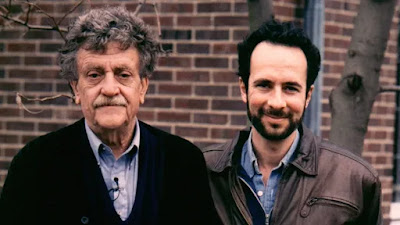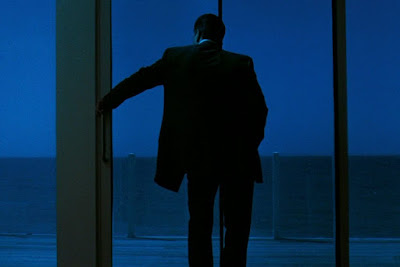Joe Turkel, who has died aged 94, was a seasoned American character actor who began his career in the late 1940s before assuming memorable roles for Stanley Kubrick and Ridley Scott in the early 1980s.
The sunken eyes and pallor he developed with age made him a boon for filmmakers requiring an otherworldly or oddball presence. In Scott’s Blade Runner (1982), Turkel played Dr. Eldon Tyrell, the eccentric, heavy-spectacled android manufacturer who meets his maker at the hands of one of his own creations: Rutger Hauer’s rogue replicant Roy Batty.
Beset by spiralling costs and creative uncertainty, the shoot was little-to-no fun. “It was pretty hairy,” Turkel later recalled. “There wasn’t much humour.” Yet the finished film became a landmark in movie design, as Turkel noted: “Flying cars, women doing crazy somersaults... and the sets were super. Oh, were they splendid! Oh, the creativity that went into that… It was a feast for the eyes!”
A Kubrick devotee, Scott had spotted Turkel (and what the director called his “polished ivory” skin) in The Shining (1980), where the actor played Lloyd, the spectral bartender who engages Jack Nicholson’s deranged author Jack Torrance in unnervingly genial conversation.
Turkel had been Kubrick’s second choice, after Harry Dean Stanton, busy with Scott’s Alien. Yet he knuckled down to his director’s typically demanding schedule, spending six weeks rehearsing with his equally committed co-star (“Jack worked his behind off”).
Turkel found Kubrick “as sweet as sugar”, rather than the gruff obsessive of lore, but then The Shining marked the culmination of a long collaboration dating back to the director’s earliest films. Kubrick first saw Turkel in the undistinguished B-movie Man Crazy (1953), telling the actor “the picture was terrible, but I liked you and what you did”.
Kubrick cast Turkel in The Killing (1956) as hired gun Tiny, disregarding the actor’s 5’8” frame, and then as Private Arnaud, the unluckiest of the three soldiers put on trial for cowardice in WW1 opus Paths of Glory (1957), Turkel’s favourite of his own films. Turkel and Philip Stone remain the only actors to have worked with Kubrick three times in credited roles, and his fealty outlived Kubrick’s passing in 1999. As he told one interviewer, “I cried for a month when he died”.
He was born Joseph Turkel on July 15, 1927 in Brooklyn, one of three sons to Polish-Jewish immigrants Benjamin and Gazella (née Goldfisher) Turkel. As a teenager, he joined the Merchant Marines, then the Army, serving in Europe at the tail-end of World War II. The experience marked him for life: “I saw things no kids should see… I saw things that made me grow up rather quickly.”
He moved to California in 1947 to explore acting, debuting alongside Tony Curtis in the juvenile-delinquency drama City Across the River (1949). Thereafter he reverted to the cinematic equivalent of gruntwork: uncredited as a Marine in WW2 drama The Halls of Montezuma (1951), as a Korean War combatant in Sam Fuller’s Fixed Bayonets! (1951), as a character dubbed Poor Loser in Friendly Persuasion (1956).
Even after Kubrick’s intervention, he found himself in such B-movies as the Hungarian Uprising-inspired The Beast of Budapest and The Bonnie Parker Story (both 1958). More prominent roles eventually came his way: among the POWs in King Rat (1965) and Steve McQueen’s crewmates in The Sand Pebbles (1966), as gangster Jake “Greasy Thumb” Guzik in The St. Valentine’s Day Massacre (1967) and a detective in The Hindenburg (1975).
Yet his 1980s highpoints proved all but a sign-off: he guested on a 1988 episode of Miami Vice, before bowing out with straight-to-video sci-fi The Dark Side of the Moon (1990). Defying an industry rumour that he’d died in 1995, he lent his voice to the Blade Runner CD-ROM game in 1997 before officially retiring in 1998.
He spent his final years writing, attending fan conventions and campaigning, addressing the Occupy Seattle rally in 2011, aged 84. His memoir The Misery of Success is set for posthumous publication.
Reviewing his career in 1999, Turkel mused “I’ve done some great films. I know other actors that have done brilliant films. They still have to go out and audition and please [producers and directors], no matter what they've done. Which is one of the reasons I left the industry... However, [if] something comes along I leave the door open. 1948 to 1998. And I've been writing since then and enjoying every minute of it. But I’ve had a hell of a career.”
He is survived by Craig and Robert, his two sons by his late wife Anita Turkel (née Cacciatore).
Joe Turkel, born July 15, 1927, died June 27, 2022.












